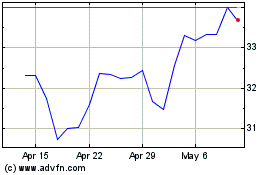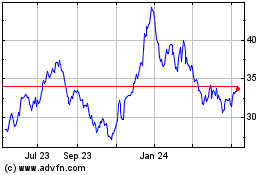Apple Asked Standards Body To Set Rules For Essential Patents
February 07 2012 - 9:30PM
Dow Jones News
Apple Inc. (AAPL) has asked a telecommunications standards body
to set basic principles governing how member companies license
their patents, an increasingly contentious topic for rivals in the
smartphone industry.
In a letter to the European Telecommunications Standards
Institute, Apple said the telecommunications industry lacks
consistent licensing schemes for the many patents necessary to make
mobile devices, and offered suggestions for setting appropriate
royalty rates that all members would follow.
Many mobile technology companies, such as Motorola Mobility
Holdings Inc. (MMI) and Samsung Electronics Co. Ltd. (005930.SE,
SSNHY), hold patents that became part of industry-wide standards.
Standards bodies often require the patent holders to offer to
license their patents to any company on a basis known as Frand, or
fair, reasonable and nondiscriminatory. Questions about such
commitments have arisen amid a flurry of patent suits between
rivals in the mobile-device market.
Apple said in its letter--which was dated Nov. 11, but not
previously disclosed--that the lack of clarity on what is fair,
reasonable and nondiscriminatory has led many companies to ask
unusually high rates and sue one another claiming they infringed on
one another's patents.
"It is apparent that our industry suffers from a lack of
consistent adherence to Frand principles in the cellular standards
arena," wrote Bruce Watrous, Apple's intellectual property
head.
Apple's move to solidify how industry-essential patent holders
should act comes at a tumultuous time. The Cupertino, Calif.,
company has been battling rivals such as Samsung, Motorola and HTC
Corp. (HTCXF, 2498.TW) in patent suits spanning courtrooms across
the globe.
At the same time, Google Inc. (GOOG), which is acquiring
Motorola, is expected to send letters to dozens of different
standards organizations in a bid to reassure them that the Internet
giant would fairly license Motorola's industry-essential patent
portfolio. Google's purchase of Motorola is being reviewed by
antitrust regulators in Europe. The European Commission has set a
Monday deadline to issue a decision on the matter.
In the letter, Apple asked the European industry standards body
to agree upon a way to set "appropriate" royalty rates for
technology, relative to the industry-wide patents necessary to make
a mobile device. Apple also said that royalties shouldn't be beyond
a common base, agreed to under a Frand commitment.
Few companies publicly disclose how much they are charging for
royalties, which vary for different kinds of products and
industries. In a letter filed in a California court last month,
however, a lawyer said Motorola had "demanded" a royalty rate of
2.25% for a license of its patents.
A rate of 2.25% on Apple's iPhone sales, for example, would have
amounted to about $1 billion in potential royalties for 2011.
Though the court letter did not specify which devices would be
affected nor whether it would be retroactive, lawyers said the lack
of transparency about royalties across the industry makes it hard
to tell if Motorola's rate was reasonable.
Apple also suggested companies shouldn't use Frand-based patents
to enforce injunctions, which prevent defendants from selling
products that infringe a plaintiff's patents. Both the iPhone maker
and its competitors have sought injunctions in patent cases to
disrupt one another's sales.
-By Ian Sherr, Dow Jones Newswires; 415-439-6455;
ian.sherr@dowjones.com
Marcus and Millichap (NYSE:MMI)
Historical Stock Chart
From May 2024 to Jun 2024

Marcus and Millichap (NYSE:MMI)
Historical Stock Chart
From Jun 2023 to Jun 2024
